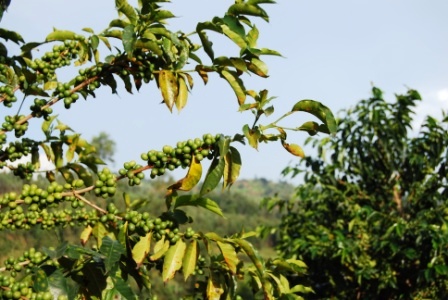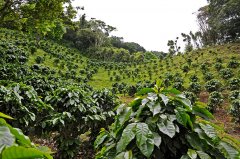Why is the altitude of coffee plants so important?
Specialty coffee is also known as specialty coffee or specialty coffee. It refers to coffee made from green beans with excellent taste characteristics grown in a few extremely ideal geographical environments. Depending on the particular soil and climatic conditions in which they are grown, they have outstanding flavors. This type of coffee is then strictly selected and graded, and its texture is hard, rich in taste, and excellent in flavor. It is a selected coffee bean.
I still remember when I opened the store, many parents who wanted to send their children abroad came to the store to ask how foreign students were doing. The Berry couple knew what they were up to. They wanted to know what was going on abroad only from the Berry couple. In fact, they don't want their children to take the berry road of no return. What's more, some parents despise berry couples for what they do. They lamented the money spent by the berry couple's parents and named the berry "wasted talent." I still remember a parent came to the store to kick the museum, leaving the following words, before waiting for the berry couple to explain, he straightened his nose and left: "I heard that the two of you came back from studying abroad and got permanent residency." Come back unexpectedly so useless, let down the parents to your education to pay the money, millions of dollars there will always be? My son is about to go to college in the United States, so don't think about this when you come back!"
Yes, in the era when Berry couple went abroad, few parents sent their children abroad. It can be said that few parents had the ability to let their children go abroad. It can be said that few parents had the ability to let their children go abroad. Berry parents send us out, but not as utilitarian as parents in today's society, they see their children going abroad as a means of investment, only hope that their children will come back to build spacecraft and become national leaders. For the parents of berries, there is only one hope for berries, and that is to understand what is called "life." Here, the berries do not mention China's political situation, just from the aspect of education, China's education has washed the brains of many generations, created many machines to promote the circulation of money, revolutionized the lives of many progressives, and trained generations of Chinese into a flock of sheep, only to see the direction of the leader, one competing with the other and trampling on each other. In fact, the leader is actually a wolf! Take the sheep to a pond full of crocodiles.
Although the cause of berries is small, at least we have pursuit and hope. Berry's behavior is to oppose those with feudal farming primitive ideas, subvert their concepts, and hit them hard with democratic and free fists and give them a good shout! To save the souls of those who still have them. Let them know what is self, what is equality, mutual respect, and consideration for others. Any unreasonable person will be driven out, and those who can enter are those who awaken in the walking dead.
Today's coffee industry in China is no longer the despised low-educated, low-paid, low-class service industry. Their research and obsession with coffee culture can be called scientist level. Today's coffee industry represents the whole tertiary industry in China. The real tertiary industry is not only the service industry that yields to others, but the retail industry and logistics industry with fair trade, quality and quantity. Coffee industry is a medium to promote the fusion of Chinese and Western cultures, we are a new generation of spiritual teachers, people's hearts home. In today's Chinese society, the relationship between people will become more and more complex and money-oriented. Only coffee, red wine, tea and other spiritual food for human beings can return a paradise to the soul in such a complicated and bloody society. I believe many people have heard a very vulgar saying: "You are not only tasting a cup of coffee, you are tasting loneliness." This really makes sense, a person in the face of others month is difficult to do their own, only in solitude, only in loneliness, can hear their own blood flow, their own heartbeat, can really talk to their own soul. And those are the kinds of spiritual foods you can find, and of course coffee is for berries.
A lot of friends know that berry couples live in a state of "eating together and waiting for death." Of course, people, come to this world, is to eat happily every day, sleep, is to die. It is people who seek trouble, who crave things outside themselves, who chase, who expect, who kill each other, who commit crimes. Then please see how those who survive die. Look at the lives of those who are not afraid of the mainstream.
Shawn Steiman is a "freak." Just like Berry's upcoming translation article, it was taken from the famous American coffee magazine "ROAST MAGAZINE" on April 8, 2015 and submitted by Shawn Steiman, a famous American coffee expert. He studied coffee cultivation all his life. He was a postdoctoral student in biology and specialized in coffee cultivation all his life. He delves into coffee science, such as coffee production, entomology, ecology, physiology, etc., to optimize coffee quality and brewing techniques. Who said anyone with a bio-PHD should study Dolly? You're gonna sleep with a girl in college? Do you think it's a professor in China?
Before translating his article, I want to explain an English problem to you. What is the difference between Altitude and Elevation? Although both mean altitude, in the Oxford Dictionary,
"Altitude is typically only used to describe the height of an aircraft in flight. It is a barometric measurement expressed relative to the height of a runway or mean sea level in a given location or region (taking into account current local atmospheric conditions), or to an arbitrary standard datum (to eliminate the effect of localised variations in air pressure).
Elevation is usually used to describe the height of the ground, or a feature fixed to the ground. It is a geometric measurement expressed relative to the mean sea level datum established for the region by the national mapping agency. "
In short, Altitude is the true altitude based on sea level, and Elevation is the vertical distance to a certain ground on the earth, that is,"ground pull." Got it?
Okay, here's the translation:
What’s So Important About High-Altitude Coffee? Why is coffee grown at high altitudes so difficult? It is pretty common to hear people talk about the importance of growing coffee at high elevations. Advertisements for mountain grown coffee date back more than 50 years and coffee companies still brag about coffees that come from high elevations. It makes you wonder if there's something magical about mountainsides or being far away from the sea. More than 50 years ago, many coffee-growing regions began claiming that their coffee was grown at high altitudes. Today, too many for-profit coffee traders often deceive consumers by fabricating their coffee as high-altitude coffee. Just like many "mountain red rice" and "mountain tea" in Taiwan, they are all tricks. This makes one wonder if the alpine coffee is of the fairy race or whether there is a group of Smurfs over there in the mountains and Haiti.
As it turns out, the scientific data is equivocal on the subject. Some research demonstrates a difference in taste as elevation changes while some does not. Many people in the coffee industry, including this author, have experience that suggests different altitudes produce different cup profiles; coffees grown higher up tend to be more acidy and complex while lower elevations tend to be more intensely coffee flavored. If there really is a difference in elevation, what’s going on? However, scientific proof of this doctrine has not proved entirely credible. There is some scientific evidence that the flavor of upland beans changes with altitude, but there is also some evidence that this is not true. Many people in the coffee industry, including myself, have demonstrated through their work experience that beans at different altitudes do respond differently when tested in cups. The coffee industry has found that beans at higher altitudes have higher acidity and a more complex flavor spectrum. But amazingly, there are still some low-altitude beans that are full of flavor. If this is true, then why is it so controversial?
Any athlete will tell you that the air in thinner at higher altitudes. This is because there’s lower air pressure up there (the weight of all the air that presses down on everything), causing less oxygen to be present in any given breath of air. Plants, however, don’t seem to care much about this. While nobody has tested the effects of different air pressures on coffee plants, researchers doing space research (astronauts need to eat, right!?) have shown that lettuce leaves changed somewhat when grown in different air pressures. However, none of the research examines the taste. Radishes, on the other hand, barely responded at all to different air pressures (unless the air pressure is very, very low). More interesting, the flavor of radishes and some chemical markers that stand in for flavor, didn’t change when the radishes were grown in different air pressure conditions. Lettuce (leaves) and radishes (roots) are different types of plant organs than coffee (seeds), so it is hard to draw a strong comparison from these examples. However, considering the nature of the changes in liquor and coffee being a seed, it is unlikely that air pressure is influencing the cup quality of coffee. It's just that the higher the altitude, the lower the air pressure, which leads to lower oxygen content in the air. However, for plants, low pressure is not so important to them. So far, no one has ever experimented with the extent to which coffee trees are affected by changes in air pressure. Just as astronauts eat, do they change their status as human beings because of what they eat? But there's been a special study of lettuce leaves growing at different pressures, and damn it, there's no point in that study, because those people haven't tasted the lettuce at all. Some people have been bored to study how root vegetables represent radish growth under different pressures, except that the pressure is very low and "dead" occurs, otherwise there is no difference. Then, leaf crops represent lettuce and root crops represent radish and coffee this embryonic crops are not significantly different, but after all, coffee berries are processed into green beans, then roasted, and then rushed out of a cup of delicious coffee, such a complex process that indicates that altitude more or less will affect the quality of coffee.
A change in air pressure is only one difference that happens at higher altitudes. The other is that the temperature drops. It has been well documented that temperature affects many aspects of plant growth and development across a range of species, including food plants like coffee. As air pressure seems not to be too important in influencing coffee's taste, it is reasonable to assume, then, that the change in temperature at higher elevations is what is influencing our brew.
The urbanization of a large scale is only one of the factors in terms of altitude. There is another thing that may be overlooked by everyone. The higher the altitude, the lower the temperature. There is already evidence on this point. Degree has a great impact on the growth and planting of many crops, including coffee. In this way, the change in altitude does not affect the taste of coffee, but the low temperature in high altitude really affects the coffee in my mouth.
To support this, we must consider that, across the globe, temperature is influenced not just by elevation. A major factor is latitude. As the distance from the equator increases, temperatures at a given elevation decrease. So, 2500 feet above sea level in Hawaii is a much cooler climate than 2500 feet above sea level in Colombia. Whereas coffee grown in Hawaii at that elevation can be acidy and complex, it is rarely found to be so in Colombia, even though the elevation is the same. While many factors influence the flavor of a cup of coffee, the temperature at which it grows seems to be one of them. Thus, looking at elevation alone is not very useful, rather, the interaction of altitude and latitude and their influence on temperature is what matters. In order to realize this, we must examine the effect of altitude on coffee planting all over the world, not the ground. Because the pullout of the ground will not necessarily affect the height, but the altitude will certainly. One of the important reasons is the degree. When the north-south latitude around the equator increases, the degree of pullout in the same place decreases. So one of the most striking examples is that the weather in Hawaii at an altitude of 1,500 feet (800 meters) is much better than that of a brother at an altitude of 1,500 feet (800 meters). As a result, coffee grown in Hawaii has higher acidity and more complex flavor. But this is not the case in Colombia, even though the elevation and elevation are close to the same value. In this way, the degree of coffee is only one of the factors that affect the taste of coffee, so it is very unscientific to look at the place where coffee is planted. On the contrary, the interaction between altitude and degree and its effect on the degree of coffee are the most important.

Important Notice :
前街咖啡 FrontStreet Coffee has moved to new addredd:
FrontStreet Coffee Address: 315,Donghua East Road,GuangZhou
Tel:020 38364473
- Prev

The Coffee planting Industry in China is booming and changing the Poverty-stricken villages
Coffee from the West and tea from the East. With the blending of Eastern and Western cultures, Eastern tea culture has long been integrated into the life of Westerners, while Western coffee has been gradually accepted by more and more Easterners. In the big cities of China, Beijing, Shanghai and Guangzhou, cafes are decorated with urban customs and become fashionable consumption elements. in recent years, China's coffee consumption market has increased by 1. 5% every year.
- Next

Are you still drinking Kopi Luwak?!
Keep you in a narrow cage. You are not allowed to eat your favorite meat and seafood. You are only allowed to eat one kind of fruit. (sometimes the fruit is not necessarily ripe) until you die. If you are malnourished, you will be given an infusion. If you make a noise and protest, you will hit you with an electric baton. Your organ function is slowly failing. If you fast, use a tube to pour into your esophagus, your esophagus and throat.
Related
- Workers collapse! Lucky suspects that it will introduce freshly cut fruits?!
- 1-point subsidy recipients wear thousand-yuan watches?! Local response: For low-income households
- Can lightly roasted coffee beans be used to extract espresso? How finely should you grind high-quality coffee beans to make Italian latte?
- What is the difference between the world's top rose summer coffee and Yejia Shefi? What are the flavor characteristics of Yega Shefi coffee and Panama rose summer?
- The ceremony is full! Starbucks starts to cut the ribbon at a complimentary coffee station?!
- A whole Michelin meal?! Lucky launches the new "Small Butter Apple Crispy Latte"
- Three tips for adjusting espresso on rainy days! Quickly find the right water temperature, powder, and grinding ratio for espresso!
- How much hot water does it take to brew hanging ear coffee? How does it taste best? Can hot water from the water dispenser be used to make ear drip coffee?
- What grade does Jamaica Blue Mountain No. 1 coffee belong to and how to drink it better? What is the highest grade of Blue Mountain coffee for coffee aristocrats?
- What are the flavor characteristics of the world-famous coffee Blue Mountain No. 1 Golden Mantelin? What are the characteristics of deep-roasted bitter coffee?

